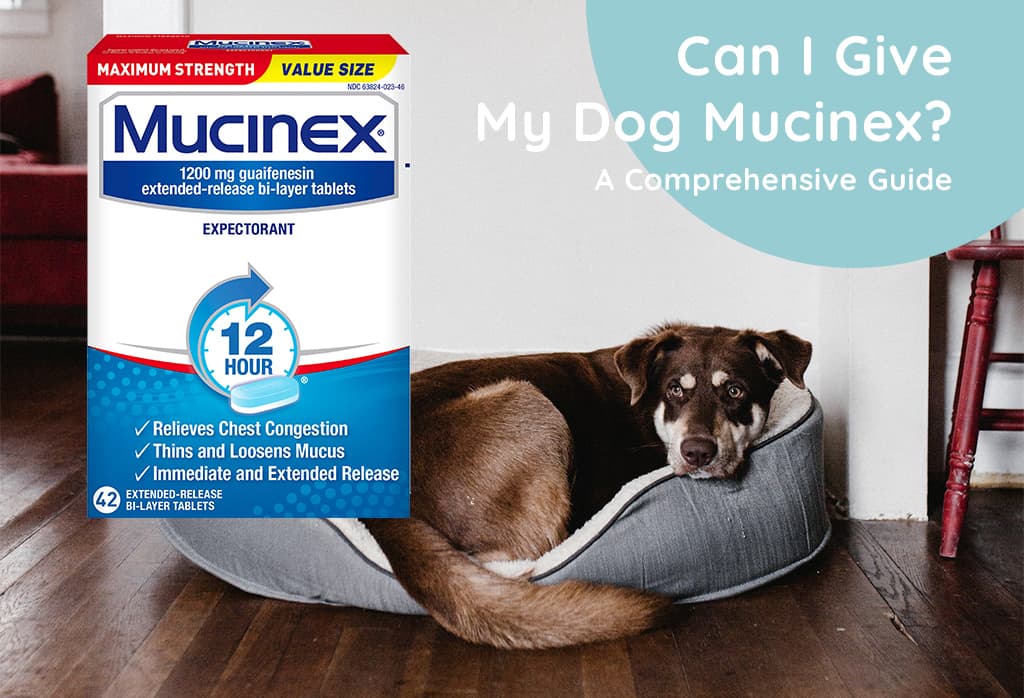Hey there, fellow dog lover! So, you’ve got a sick pooch on your hands, and you’re wondering if Mucinex can be your trusty sidekick in this battle.
I get it, you’d do anything for your furry friend.
But before you start playing doctor, let’s chat about Mucinex, why pet owners might think of using it, and why it’s super important to consult with a real doc (aka a veterinarian) first.
A brief overview of Mucinex and its use for humans
Mucinex is this pretty nifty medicine humans use to break up all the gross, sticky mucus that comes with colds and respiratory infections.
It’s got an active ingredient called guaifenesin, which helps us breathe easier and feel less like we’re drowning in our own snot.
Lovely, right?
Common reasons why pet owners might consider giving Mucinex to their dogs
Now, when our four-legged friends get all snotty and congested, it’s natural to wonder if Mucinex can work its magic on them too.
After all, they’re part of the family, and we want them to feel better as soon as possible.
Importance of consulting a veterinarian before administering medications
But here’s the thing—our pets aren’t just tiny, furrier versions of us.
They’ve got their own unique biology, which means what works for us might not be the best for them.
That’s why it’s crucial to check in with your vet before you start doling out any meds.
Can I Give My Dog Mucinex?
So, can you give your dog Mucinex? Let’s break it down, shall we?
Differences between human and canine physiology
First off, remember how I said our pets aren’t just mini humans? Yeah, that’s important.
Dogs have a different metabolism and sensitivity to certain medications.
This means what’s safe for us might be harmful or even deadly for them.
Potential risks and side effects of giving Mucinex to dogs
Administering Mucinex to your dog without a vet’s approval is a bit like jumping into battle without a plan.
It could lead to a whole bunch of issues that you definitely don’t want to deal with.
Let’s break down some of the potential risks and side effects:
Gastrointestinal problems
Sharing your Mucinex with your dog could cause an upset stomach, leading to vomiting, diarrhea, or even worse, gastrointestinal ulcers.
And trust me, no one wants to clean up that mess.
Allergic reactions
Just like humans, dogs can have allergic reactions to medications.
Symptoms might include hives, itching, facial swelling, or trouble breathing.
If your pup shows any of these signs after taking Mucinex, call your vet right away.
We don’t want your dog to feel like they’ve been bitten by some weird supernatural creature, do we?
Overdose
Since Mucinex isn’t formulated for dogs, it’s way too easy to accidentally give them too much.
An overdose can cause anything from mild symptoms like drowsiness and drooling to severe reactions like seizures, coma, or even death.
It’s not a risk worth taking.
Drug interactions
If your dog is already taking other medications, Mucinex could interact with them and cause adverse effects.
It’s like mixing a bunch of random ingredients in a potion without knowing what they do—it’s just not a good idea.
Unknown long-term effects
We don’t have enough research on how guaifenesin, the active ingredient in Mucinex, affects dogs long-term.
So giving it to your furry friend is like stepping into a mystical portal without knowing where it leads.
It’s best to avoid that unknown territory.
In a nutshell, giving your dog Mucinex without a vet’s guidance is risky business.
There’s no need to take chances when there are safer alternatives available.
So, be a responsible pet parent and consult with a professional before medicating your pup.
When a veterinarian might recommend Mucinex for dogs
Now, I’m not saying Mucinex is always a no-go for dogs.
In some cases, a vet might actually recommend it, but only in specific doses and under their watchful eye.
So, if you’re considering Mucinex for your pup, always check with a professional first.
Alternative Treatments for Common Canine Ailments
If Mucinex isn’t the hero we’re looking for, what other options are there to help our furry friends feel better?
Natural remedies for coughs and colds in dogs
Steam therapy
Have your pup hang out with you in a steamy bathroom.
It’s like a spa day that can help them breathe easier.
Honey
A little honey can soothe a dog’s cough.
Just don’t overdo it, ’cause too much sugar isn’t great for anyone.
Herbal remedies
Some herbs, like licorice root and mullein, can help with respiratory issues.
But again, consult your vet before going all herbalist on your dog.
Canine-specific over-the-counter medications
Some dog-friendly meds can help with coughs and congestion, like:
Cough suppressants: A vet might prescribe dog-safe cough suppressants to help your pooch feel better.
Decongestants
Certain decongestants are made just for dogs, so they can breathe easier without getting all hopped up on human meds.
Antihistamines
If allergies are causing your pup’s sniffles, antihistamines could be the ticket.
But remember, always check with your vet first!
When to consult a veterinarian for your dog’s symptoms
If your dog is showing signs of a respiratory issue, like coughing, sneezing, or wheezing, it’s time to call the vet.
They’ll help you figure out what’s going on and the best course of action to get your sidekick back in tip-top shape.
Preventing Respiratory Issues in Dogs
Of course, the best way to deal with respiratory issues is to prevent them in the first place.
Here’s how to keep your dog healthy and sniffle-free:
Routine vaccinations and check-ups
Keep your dog up to date on vaccinations and regular vet visits.
An ounce of prevention is worth a pound of cure, or so they say!
Proper grooming and hygiene
Regular grooming helps keep your dog’s coat clean and free of allergens, so they can spend less time sneezing and more time playing fetch.
Providing a clean and healthy living environment
A clean home is a healthy home.
Make sure your dog’s space is free of dust, mold, and other irritants that could make them feel crummy.
Frequently Asked Questions (FAQ)
Now, let’s tackle some burning questions you might have about your dog’s health:
How much mucinex can i give my dog?
While the suggested dosing for Mucinex is one-half tablet (50 mg/5 mg) every four hours for smaller pets and one tablet (100 mg/10 mg) for larger dogs, it’s crucial to remember that self-medicating your pet can be risky. Before administering any medication, always consult your veterinarian to ensure it’s the appropriate and safe choice for your pet’s specific condition.
What symptoms should I look for in my dog that may require medical attention?
Watch for excessive coughing, sneezing, wheezing, difficulty breathing, or discharge from the nose or eyes.
These could all be signs that it’s time to call the vet.
Can I give my dog other human medications, such as ibuprofen or acetaminophen?
Nope, big no-no! These meds can be toxic to dogs.
Always consult your vet before giving your dog any medication.
How can I tell if my dog is experiencing side effects from medication?
If your dog seems extra lethargic, has a loss of appetite, or experiences vomiting or diarrhea after taking medication, these could be signs of side effects.
Get in touch with your vet ASAP.
Are there any dog breeds that are more prone to respiratory issues?
Some breeds, like brachycephalic (short-nosed) breeds, are more likely to have respiratory issues.
But any dog can develop them, so it’s important to keep an eye on your pup’s health.
How can I help my dog recover from a respiratory illness?
Follow your vet’s advice, make sure your dog gets plenty of rest, and provide them with a comfy, clean environment.
And, of course, lots of love and snuggles!
Conclusion
Alright, so here’s the deal.
Always consult a veterinarian before giving any medication to your dog.
They’re the experts, and they’ll help you figure out the best way to help your furry companion.
Explore alternative treatments and preventative measures to keep your dog healthy and happy.
Remember, a healthy dog is a happy dog, and a happy dog makes for a happy pet parent!









